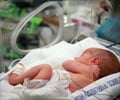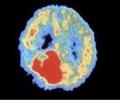Using a new blood test researchers have pinpointed which strains of the Toxoplasma gondii parasite, cause severe illness among newborns in the United States.

“If undetected or untreated, congenital toxoplasmosis can have serious consequences for a child’s quality of life,” noted NIAID Director Anthony S. Fauci, M.D. “The findings from this study support the value of screening for toxoplasmosis to identify patients who could benefit from treatment.”
Currently available blood tests can determine whether a person has ever been infected with any strain of Toxoplasma parasite. The experimental test developed at NIAID improves upon the older tests because it can detect the presence of strain-specific antibodies that distinguish infecting strains from one another. The test was developed by Michael Grigg, Ph.D., of NIAID’s Laboratory of Parasitic Diseases, and his colleagues. It was applied to blood samples collected between 1981 and 2009 as part of the National Collaborative Chicago-Based Congenital Toxoplasmosis Study. The study of congenitally infected children was initiated by NIAID grantee Rima McLeod, M.D., of the University of Chicago, who is the first author of the new study, published online in Clinical Infectious Diseases.
At least 15 distinct T. gondii strain types have been found throughout the world. In France, where research has been done to establish which strains are most common, a strain called type II predominates. Type II parasites can be distinguished from all other strains, which are collectively termed not exclusively type II strains (or NE-II).
Using the new test, the researchers found evidence of either type II or NE-II infections in 183 of the mother-child pairs in the national congenital toxoplasmosis study. Statistical analysis revealed that NE-II parasites were more likely to be associated with premature birth, and infants infected with these strains were more likely to have severe manifestations of disease than infants infected by type II parasites. For example, severe eye damage was seen in 67 percent of NE-II cases (59 out of 88), while such eye damage was present in only 39 percent of type II cases (18 out of 46). The researchers noted, however, that the association is not absolute, and that mild, moderate or severe disease can result regardless of the infecting strain.
“We knew that, in mice, certain parasite strains are clearly associated with severe disease,” said Dr. Grigg. “But we didn’t know if the same association between strain type and disease severity would hold true for people. Until now, we had not systematically determined whether infected people in the United States had European-type strains or other types, and we also hadn’t determined whether strains found here would have more severe disease symptoms associated with them.”
Advertisement
In France, all pregnant women are screened for Toxoplasma infection. Prompt treatment is offered to any woman who becomes infected while pregnant, thus lessening the chance that the parasite will damage the fetus, Dr. McLeod noted. “In the United States, obstetrical screening for Toxoplasma infection is rarely practiced. This new study underscores the value of identifying all patients who will benefit from treatment and suggests that widespread screening and treatment of pregnant women who are infected could prevent infants from suffering eye and brain damage due to congenital toxoplasmosis,” she said.
Advertisement
Source-Eurekalert










